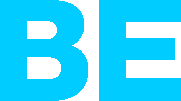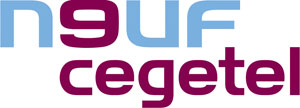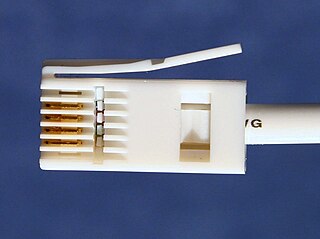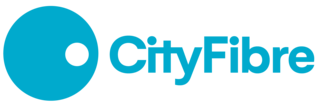Related Research Articles

Integrated Services Digital Network (ISDN) is a set of communication standards for simultaneous digital transmission of voice, video, data, and other network services over the digitalised circuits of the public switched telephone network. Work on the standard began in 1980 at Bell Labs and was formally standardized in 1988 in the CCITT "Red Book". By the time the standard was released, newer networking systems with much greater speeds were available, and ISDN saw relatively little uptake in the wider market. One estimate suggests ISDN use peaked at a worldwide total of 25 million subscribers at a time when 1.3 billion analog lines were in use. ISDN has largely been replaced with digital subscriber line (DSL) systems of much higher performance.
Local loop unbundling is the regulatory process of allowing multiple telecommunications operators to use connections from the telephone exchange to the customer's premises. The physical wire connection between the local exchange and the customer is known as a "local loop", and is owned by the incumbent local exchange carrier. To increase competition, other providers are granted unbundled access.

Eircom Limited, trading as Eir, is a large fixed, mobile and broadband telecommunications company in Ireland. The now privatised company, which is currently incorporated in Jersey, traces its origins to the Ireland's former state-owned monopoly telecommunication provider Telecom Éireann and its predecessors, P&T and before the foundation of the state, the telecommunications division of the GPO. It remains the largest telecommunications operator in Ireland and has overseas operations focused on the business and corporate telecom markets in the United Kingdom. The company was in majority state ownership until 1999, when it was privatised through a floatation on the Irish and New York Stock Exchanges.
The public switched telephone network (PSTN) is the aggregate of the world's telephone networks that are operated by national, regional, or local telephony operators. It provides infrastructure and services for public telecommunication. The network consists of telephone lines, fiber optic cables, microwave transmission links, cellular networks, communications satellites, and undersea telephone cables interconnected by switching centers, such as central offices, network tandems, and international gateways, which allow telephone users to communicate with each other.
A naked DSL, also known as standalone or dry loop DSL, is a digital subscriber line (DSL) without a PSTN service — or the associated dial tone. In other words, only a standalone DSL Internet service is provided on the local loop.
The 21st Century Network (21CN) programme is the data and voice network transformation project, under way since 2004, of the UK telecommunications company BT Group plc. It was intended to move BT's telephone network from the AXE/System X Public Switched Telephone Network (PSTN) to an Internet Protocol (IP) system. As well as switching over the PSTN, BT planned to deliver many additional services over their new data network, such as on-demand interactive TV services.
System Y is the terminology used by BT, the main operator of the telephone network in the United Kingdom, to refer to the Ericsson AXE digital switching system.

Be Unlimited was an Internet service provider in the United Kingdom between 2004 and 2014. Initially founded as an independent company by Boris Ivanovic and Dana Tobak in 2005, it was bought by Spanish group Telefónica Europe in 2006 before being sold on to BSkyB in March 2013 in an agreement which saw BSkyB buy the fixed telephone line and broadband business of Telefónica Europe which at the time traded under the O2 and BE brands. The deal saw BSkyB agree to pay £180 million initially, followed by a further £20 million after all customers had been transferred to Sky's existing business. The sale was subject to regulatory approval in April 2013, and was subsequently approved by the Office of Fair Trading on 16 May 2013.
Openreach Limited is a company wholly owned by BT Group plc, that maintains the telephone cables, ducts, cabinets and exchanges that connect nearly all homes and businesses in the United Kingdom to the national broadband and telephone network. It was established in 2006 following an agreement between BT and the UK's telecoms regulator, Ofcom, to implement certain undertakings, pursuant to the Enterprise Act 2002, to ensure that rival telecom operators have equality of access to BT's local network.
Sky Broadband is a broadband service offered by Sky UK in the United Kingdom. With the introduction of Sky Fibre, Sky Broadband now refers to ADSL broadband products.
Metallic path facility (MPF) are the unshielded twisted pair of copper wires that run from a main distribution frame (MDF) at a local telephone exchange to the customer. In this variant, both broadband and voice (baseband) services, together potentially with a video on demand service, are provided to the end user by a single communications provider. MPF services are typically delivered through use of an MSAN.

Neuf Cegetel was a French wireline telecommunications service provider and a mobile virtual network operator (MVNO). It offered various telecommunications services to consumers, enterprises and wholesale customers, ranking second in the country in annual revenues. It was legally established in 2005 following the completion of the merger between Neuf Telecom and Cegetel. As of June 2008, the company became a wholly owned subsidiary of SFR, and the brand disappeared commercially.
BT Wholesale and Ventures was a division of United Kingdom telecommunications company BT Group that provided voice, broadband, data, hosted communication, managed network and IT services to communications providers (CPs) in Great Britain. It was merged with BT's Business and Public Sector division to form BT Enterprise in October 2018.

The United Kingdom has been involved with the Internet throughout its origins and development. The telecommunications infrastructure in the United Kingdom provides Internet access to businesses and home users in various forms, including fibre, cable, DSL, wireless and mobile.

British telephone sockets were introduced in their current plug and socket form on 19 November 1981 by British Telecom to allow subscribers to connect their own telephones. The connectors are specified in British Standard BS 6312. Electrical characteristics of the telephone interface are specified by individual network operators, e.g. in British Telecom's SIN 351. Electrical characteristics required of British telephones used to be specified in BS 6305.
A managed facilities-based voice network (MFVN) is a communications network managed, operated, and maintained by a voice service provider that delivers traditional telephone service via a loop start analog telephone interface. MFVNs are interconnected with the public switched telephone network (PSTN) or other MFVNs and provide dialtone to end users. Historically, this was provided by equipment at Bell company central offices, however today's MFVNs can include a combination of access network, battery-backed customer premises equipment (CPE), network switches and routers, network management systems, voice call servers, and gateways to the broader PSTN.
Easynet Connect was a UK-based Internet service provider. The Easynet Connect brand was founded on 7 January 2008 to focus on small-to-medium size companies with 11-249 employees. Easynet Connect’s core focus was as a business ISP, providing Internet access connectivity, colocation services and hybrid cloud computing services to small businesses and resellers in the UK. It was headquartered in London, with customer service and hosting centres in London and Somerset.

CityFibre is an independent British network provider, providing gigabit-capable FTTP broadband across the UK. It is the third-largest network provider in the UK, after Openreach and Virgin Media. It is sometimes referred to as an "altnet", in reference to being an alternative option to Openreach.
As in numerous other countries, the United Kingdom is retiring its part of the global circuit-switched Public Switched Telephone Network.
References
- ↑ "What is Wholesale Line Rental (WLR) for Business? | AdEPT". www.adept.co.uk. 2020-12-24. Retrieved 2022-05-18.
- ↑ "How to switch your broadband supplier - A Complete Guide | thinkbroadband". www.thinkbroadband.com. Retrieved 2022-05-18.
- ↑ "Openreach puts the stopper on copper". www.openreach.com. Retrieved 2023-10-04.
- ↑ "BT Switch Off 2025". Comms Connect. Retrieved 2023-10-04.